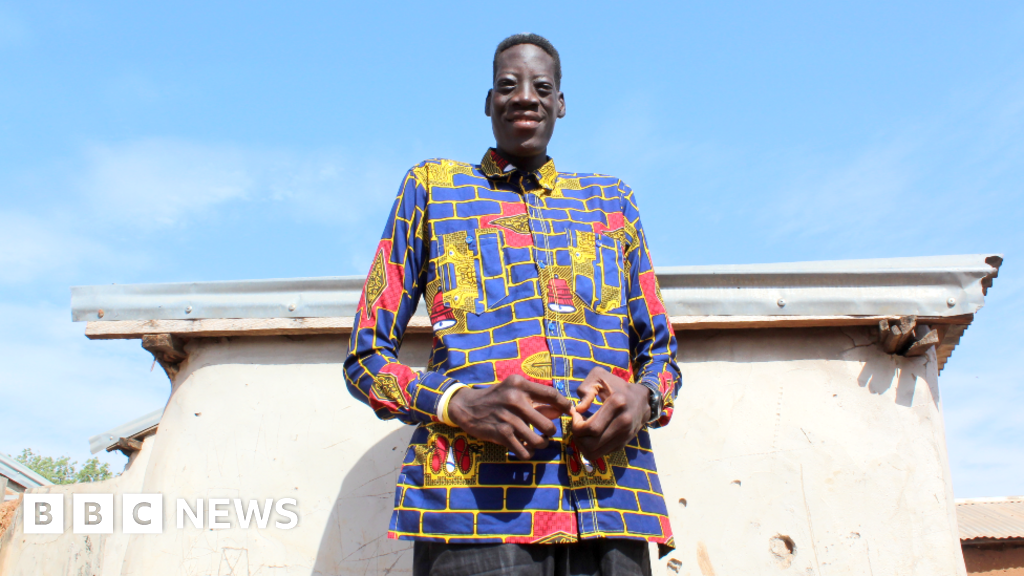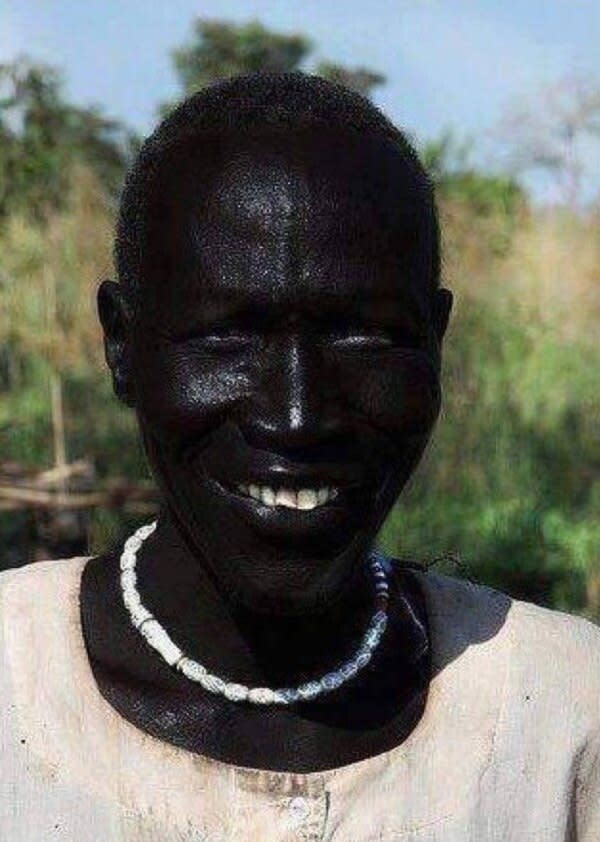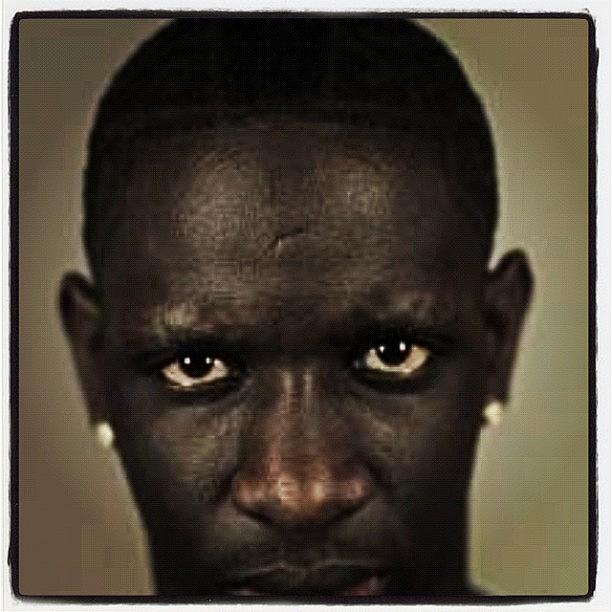Have you ever wondered who holds the title of "the blackest person alive"? It’s not just about complexion—it’s a story that dives deep into identity, culture, and human diversity. This isn’t your average article; we’re going to explore this topic with real talk, some cool facts, and a sprinkle of humor. So grab your favorite drink, and let’s dive in!
When someone mentions "the blackest person alive," it might sound like a simple question at first glance. But trust me, there’s more to it than meets the eye. We’re talking about melanin levels, cultural representation, and even social perceptions. This article isn’t just about finding an answer—it’s about understanding the broader context behind the question.
Before we get started, let’s clear something up. This isn’t about ranking or comparing people based on skin tone. Instead, it’s about celebrating diversity, exploring the science behind melanin, and understanding how society perceives and interacts with different shades of blackness. Ready? Let’s go!
Read also:Beth Leonard Net Worth The Inside Story Youve Been Waiting For
Table of Contents
- Biography of Key Figures
- The Science Behind Melanin
- Cultural Impact of Dark Skin
- Busting Myths About Melanin
- Celebrity Blackness: Who’s in the Spotlight?
- Social Perception of Dark Skin
- Health Implications for Darker Skin
- Global Diversity in Blackness
- Famous Individuals Known for Their Dark Complexion
- Conclusion: Celebrating Blackness
Biography of Key Figures
Let’s kick things off by meeting some key figures who embody the idea of "the blackest person alive." These individuals aren’t just defined by their skin tone—they’re icons of resilience, talent, and pride in their heritage.
Meet the Legends
One name that often comes up in this conversation is Samuel L. Jackson. Known for his deep voice and iconic roles in movies like "Pulp Fiction" and "Jack Ryan," Jackson is not only celebrated for his acting skills but also for his rich, dark complexion. Another name worth mentioning is Viola Davis, an actress who has shattered glass ceilings in Hollywood with her powerful performances and unwavering confidence in her blackness.
Here’s a quick snapshot of these legends:
| Name | Profession | Notable Works | Age |
|---|---|---|---|
| Samuel L. Jackson | Actor | Pulp Fiction, Star Wars | 74 |
| Viola Davis | Actress | How to Get Away with Murder, Fences | 58 |
The Science Behind Melanin
Alright, let’s geek out for a moment. What exactly makes someone “the blackest person alive”? The answer lies in melanin, the pigment responsible for determining skin color.
Melanin comes in two main types: eumelanin (responsible for brown and black tones) and pheomelanin (responsible for red and yellow tones). People with darker skin have higher levels of eumelanin, which protects them from harmful UV rays. It’s like nature’s built-in sunscreen!
Fun Fact
- Dark-skinned individuals produce up to 10 times more melanin than those with lighter skin.
- Melanin also plays a role in hair and eye color.
Cultural Impact of Dark Skin
Throughout history, dark skin has been both celebrated and stigmatized. In many African cultures, having a dark complexion is seen as a symbol of beauty and strength. However, in other parts of the world, colorism has created barriers for people with darker skin.
Read also:Andrea Espada Husband The Untold Story Behind The Spotlight
Colorism refers to discrimination based on skin tone within the same racial group. It’s a real issue that affects millions of people worldwide. But here’s the thing—dark skin is beautiful, powerful, and deserves to be celebrated just as much as any other shade.
Busting Myths About Melanin
Let’s clear up some misconceptions about melanin and dark skin. Here are a few common myths:
- Myth: Dark-skinned people don’t need sunscreen.
- Reality: While melanin provides some protection, dark skin can still burn and is susceptible to skin cancer.
- Myth: Darker skin ages faster.
- Reality: The opposite is true! Melanin helps slow down the aging process by protecting the skin from UV damage.
Celebrity Blackness: Who’s in the Spotlight?
When it comes to celebrating blackness, celebrities play a huge role in shaping public perception. From Beyoncé to Lupita Nyong’o, these stars are using their platforms to promote self-love and acceptance.
Lupita Nyong’o, for example, has become a symbol of beauty and confidence for dark-skinned women around the world. Her Oscar-winning performance in "12 Years a Slave" showcased her talent, while her outspoken advocacy for body positivity has inspired millions.
Social Perception of Dark Skin
Social media has given a voice to people who were once marginalized. Platforms like Instagram and Twitter are filled with hashtags celebrating blackness, such as #BlackGirlMagic and #DarkSkinBeauty.
But it’s not all sunshine and rainbows. Dark-skinned individuals still face challenges in areas like job opportunities, media representation, and everyday interactions. It’s crucial that we continue to push for change and create spaces where everyone feels valued.
Health Implications for Darker Skin
While melanin offers protection against UV rays, it also comes with its own set of health considerations. For example, darker skin is more prone to hyperpigmentation and requires special care to maintain a healthy glow.
Here are a few tips for taking care of dark skin:
- Use gentle cleansers to avoid irritation.
- Moisturize regularly to keep the skin hydrated.
- Protect your skin from the sun with a broad-spectrum sunscreen.
Global Diversity in Blackness
Blackness isn’t a one-size-fits-all concept. It looks different depending on where you are in the world. In Nigeria, for example, dark skin is celebrated as a sign of beauty and resilience. In Brazil, Afro-Latinx communities are reclaiming their identity and challenging stereotypes.
This diversity is what makes blackness so powerful. It’s not about conforming to a single standard—it’s about embracing all the different ways blackness can be expressed.
Famous Individuals Known for Their Dark Complexion
Here are a few more names you should know:
- Idris Elba: A British actor known for his roles in "The Wire" and "Thor."
- Naomi Campbell: A supermodel who broke barriers in the fashion industry.
- Chadwick Boseman: An actor and activist who inspired millions with his portrayal of Black Panther.
Conclusion: Celebrating Blackness
In conclusion, the question of "the blackest person alive" isn’t as straightforward as it seems. It’s not just about skin tone—it’s about celebrating the richness and diversity of blackness in all its forms.
So what can you do? Start by educating yourself on the issues affecting dark-skinned individuals. Support brands and creators who uplift black voices. And most importantly, embrace your own unique beauty and share it with the world.
Now it’s your turn! Leave a comment below and let me know what blackness means to you. And don’t forget to share this article with your friends—it’s time we start a conversation that matters.


